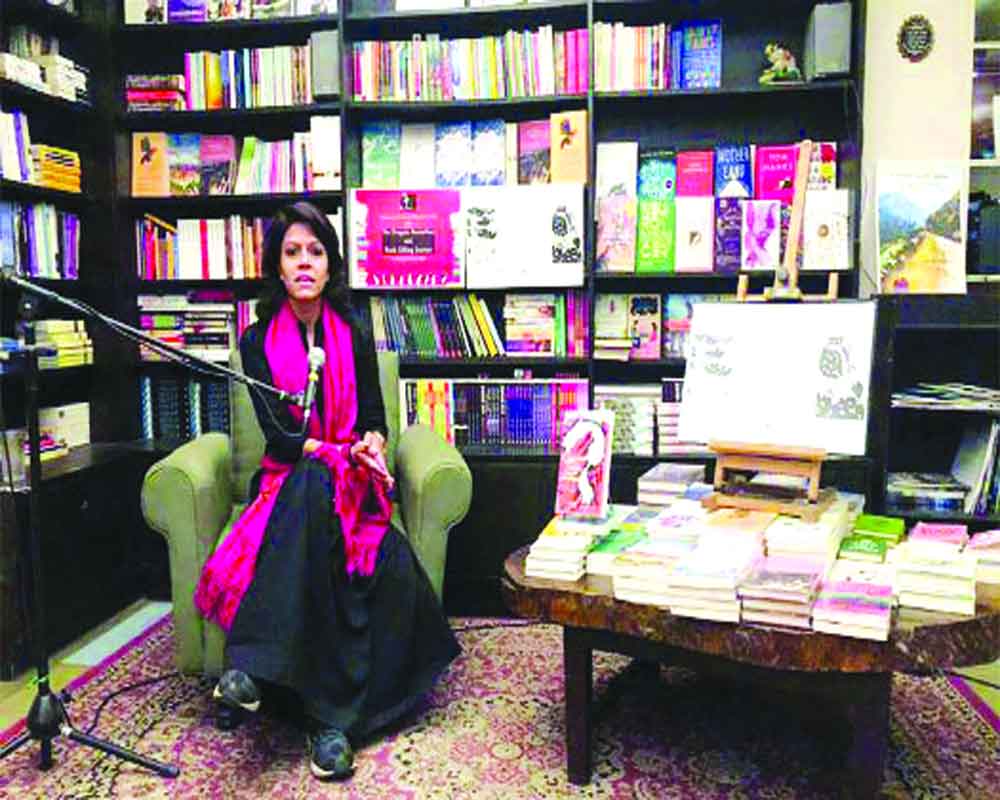As the Kathakar Storytelling Festival reaches its 12th edition, co-director Shaguna Gahilote tells Chahak Mittal that this year’s novelty comprises music and Buddhist chanting
Certainly, the joy of reading is a deeply personalised experience, depending on the associative imagery and perception it creates in the mind. But storytelling connects you to others, the sound and rhythm of words helping you construct a picture that you can share with others and even take something from them.
Author Shaguna Gahilote, co-director of the Kathakar Storytelling Festival, looks at it this way — it is one thing to be reading a story and another to visualise the same story and experience it along with personal references and anecdotes told live. “If you read something and hear the same story in an open space, you’d feel about it so differently. This festival is all about that and so unique. You will understand what the magic of storytelling is,” she says, adding that listening to the story in that particular ambience and absorbing that vibe makes it worthwhile. “This is also a reason why we have chosen an old venue this time” — Sunder Nursery, a 16th-century heritage park complex adjacent to Humayun’s Tomb.
The festival’s 12th edition this year has some new elements. She says, “We have added an element of music to storytelling this time, a throwback to the tradition of the bard. Of course, the idea has originated from Mohit Chauhan, our patron. We have invited a few storytellers who tell stories through music. They have flown from Australia, Sweden and Poland. Then there are enchanting Buddhist monks and a disciple of Taufiq Qureshi.”
A bunch of professional and passionate raconteurs from all over the world will also be present. With 17 sessions in total post-sunset, the festival will also feature morning segments in a string of Delhi schools. “The morning sessions facilitate the participation of children from Delhi’s municipal, government, private, community and civil society school. The sessions are divided in primary and secondary level where children from the age group of eight years onwards listen to stories,” says she.
There will be a focus on India’s rare art forms and native folktales, who will rub shoulders with those from Romania, Mongolia, Lithuania and the United Kingdom. So how did she and Prathana, sister and co-director, first conceptualise this festival? They started it in 2010 when the Right to Education was introduced and in every annexure mentioned that all schools should have a library with books and newspapers. “As part of UNESCO, we had been building libraries in schools for underprivileged children but not many of them would pick up the books or read them fondly. Someone had to read out the books to them to help them understand it better and find it interesting. This realisation hit us.
We brainstormed and came to another realisation that there was a time when no written text was there for people to experience stories. They only heard them. And they travelled from one person to another and across generations. Even we have only heard so many stories that were really ancient,” says she. The sisters thought that such a festival would not just revive ancient folklores but also preserve them. The festival was hence launched under the aegis of UNESCO as part of Ghummakkad Narain, a travelling literature festival in memory of Thakur Vishva Narain Singh, the first Braille editor in India.
Well, little did they know that starting out from a handful of people, about 250 of them, they would host a footfall of more than 10,000 people per day during the three-day event.
This generation’s growing dependence on technology and the easy availability of things in the comfort of one’s home have changed the idea of storytelling greatly. With digital media and online content, there has been a decline in people’s physical movement or live experiences. However, Shaguna believes, “We don’t do this festival everyday or every month. Even though you can listen to or watch or read stories sitting in the comfort of your homes, such things are worth experiencing once in a long time. It’s different. There, you live the story.”
Over the years, the festival has drawn celebrities too, like spiritual speaker Sadhguru, filmmaker Imtiaz Ali and a few Dastangos. While Imtiaz will be hosting the closing show, Kissey, Kahani aur Cinema, telling his stories of filmmaking, this is the first time the festival will see Buddhist chanting by Grammy awardee monks from the Sherabling Monastery, Himachal Pradesh. There are other first-timers too — performance of two Polish storytellers, one of whom, Emilia Raiter, is a renowned harpist and sings Polish ballads. Uncle Larry Walsh, an Australian aborigine storyteller, will be travelling with Ron Murray, a didgeridoo player, to tell tales of the indigenous people. “This will be the first time that an indigenous storyteller will perform in India,” says Shaguna when we ask her about how the team has chosen the stories, which can also be targeted to inspire the youth and develop their social awareness. She adds, “Every storyteller has a long list of stories to tell and they’re usually with a moral, something that relates to the audience.”
UK-based Emily Hennessey will perform Indian folktales of Kali and the Mahabharata. “Even though she could have told the tales of English epics or culture, we have specifically asked her to narrate Indian folklore. She has performed a lot on some aspects and episodes of Mahabharata even in the UK,” says Shaguna.
Kerala’s traditional Tholpavakoothu puppeteers will enchant the audience with their famed shadow theatre based on the theme of Tamil epic Kamba Ramayana. Theatre artist Danish Hussain will be presenting “a self-directed adaptation” of Qissebazi: A Multilingual Storytelling Orbit.
“We also have actor Manoj Bajpayee performing as a storyteller along with Mohit,” she adds.


























